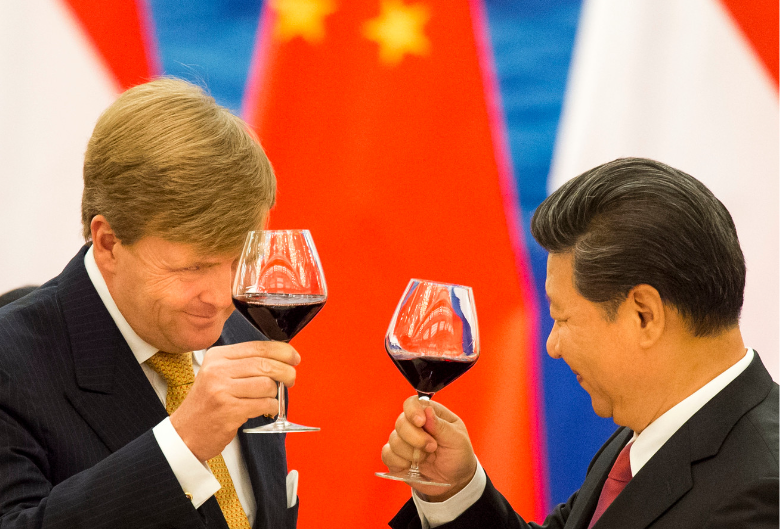ASML Sales Display State of Global Microchip Race
Dutch King Willem-Alexander toasts Chinese President Xi Jinping toast at bilateral talks held in the Great Hall of the People on Oct. 6, 2015 (AD Photo/Robin Utrecht)
On Nov. 8, Dutch Company ASML reported a shipment increase of 29.5 percent in October year on year to PRC-based companies and the PRC itself. This in and of itself is nothing groundbreaking or even surprising: ASML is responsible for creating the machinery required to create the world's most advanced microchips, so it follows logically that any nation would like to increase their production capability in order to produce the most advanced computers possible. ASML, however, does not exist in a vacuum and currently finds itself a critical keystone in an ever-intensifying exchange of sanctions between an American-led coalition and China.
To first understand how ASML is so integral to both the West and China, it is first necessary to understand what is being fought over. The chips made by ASML machines are the most advanced ones in the world. The cutting edge of these are 2-nanometer chips, which put roughly 50 billion transistors, each transistor being the size of five atoms, all on a space the size of a fingernail. For reference, the Apollo 11 shuttle that first landed a man on the moon had roughly 5,600 transistors in its navigation system.
Chips that concentrate that much power in such a small space have enormous potential across almost all sectors of the economy, having the potential, among other things, to enhance phone batteries, cut carbon and space footprints required for data centers, and compute the safest automation available for self-driving cars. They also could prove game-changers in AI prediction capabilities and military equipment for governments. Hence, the urgency with which Western governments are acting on 2-nm chip distribution management is understandable.
In August, the US government began implementing restrictions on investments American companies can make overseas, specifically targeting microelectronics. On Sept. 1, the Dutch government officially joined the US-led drive and activated chip equipment exports, thereby leaving ASML only until year's end to sell equipment to China before restrictions take effect (current licenses for advanced technology sale will not be renewed). ASML had already been banned from exporting their most advanced chips to China, only being able to export equipment for chips 7-nm and above. The new measures will exclude even these from sale.
Exterior view of the head office of ASML, a leading maker of semiconductor production equipment, in Veldhoven, Netherlands, Monday, Jan. 30, 2023. (AP Photo, Peter Dejong)
China’s subsequent buying spree should then come as no surprise. Taking advantage of the last gasp before the door closes, Chinese companies and the Chinese government increased sales 1,850 percent in September compared to a year earlier, up to $1.3 billion. China accounted for 46 percent of ASML's third quarter sales, resulting in a 24 percent bump from quarter two. This high rate of spending is occurring simultaneously with an overall decrease in EU-China trade by 7.5 percent in October year on year, with exports falling by 10.6 percent. When pressed for thoughts on the potential loss of China as such a major source of revenue, German director for technology and geopolitics at the SNV thinktank Peter Kleinhans, speaking on behalf of ASML, noted that "a strong backlog of around $41 billion provides us with a good basis to navigate these short-term uncertainties."
The earth-shaking sums of money involved with ASML alone reveal how serious the USA and EU are becoming with their strategies towards China as well as how expensive those strategies will truly be. While ASML claims that both its long-term scenarios and current year outlook remain largely unchanged by the deal, the implications for the unprecedentedly efficient supply chain webs that fuel the modern world could become a slippery slope. Dutch lawmaker Laurens Dassen in response to the new restrictions has pointed out that "You already see that China is starting to produce these chips itself instead of buying them from us," meaning that such costly measures may not even pay off in the long run.
Rising tension between China and the USA is increasingly forcing nations with vital resources like the Netherlands into uncomfortable decisions that result in increasingly painful collateral damage while threatening to snowball into a global economic split, the likes of which not seen since the Cold War. Cases like that of ASML provide invaluable snapshots into how far along the process we are and what chances remain at reconciliation, only time will tell if the sides can pull back from the brink.


